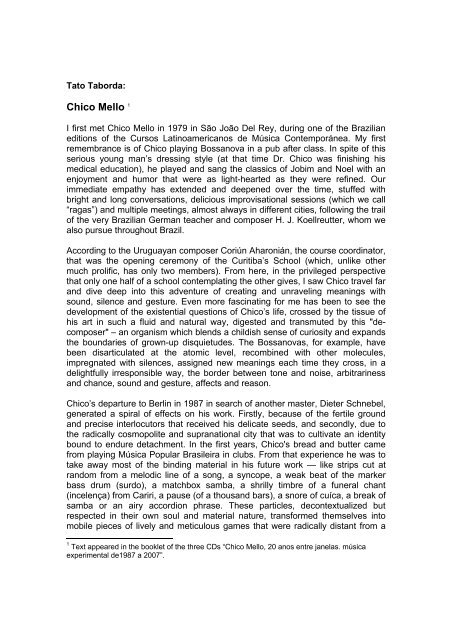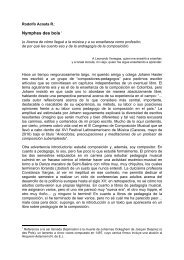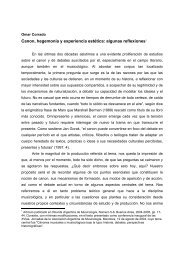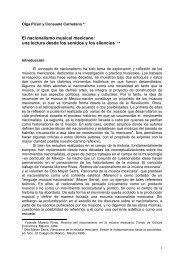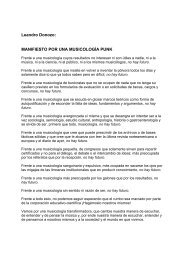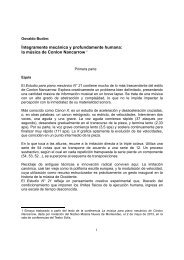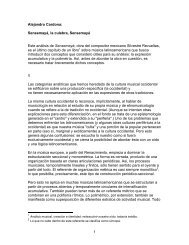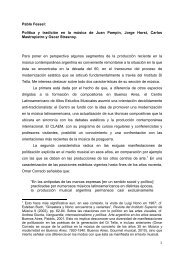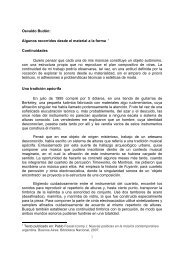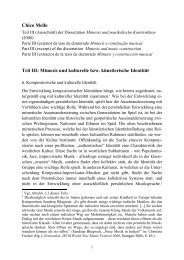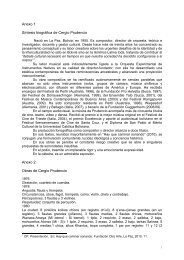Chico Mello 1
Chico Mello 1
Chico Mello 1
You also want an ePaper? Increase the reach of your titles
YUMPU automatically turns print PDFs into web optimized ePapers that Google loves.
Tato Taborda:<br />
<strong>Chico</strong> <strong>Mello</strong> 1<br />
I first met <strong>Chico</strong> <strong>Mello</strong> in 1979 in São João Del Rey, during one of the Brazilian<br />
editions of the Cursos Latinoamericanos de Música Contemporánea. My first<br />
remembrance is of <strong>Chico</strong> playing Bossanova in a pub after class. In spite of this<br />
serious young man’s dressing style (at that time Dr. <strong>Chico</strong> was finishing his<br />
medical education), he played and sang the classics of Jobim and Noel with an<br />
enjoyment and humor that were as light-hearted as they were refined. Our<br />
immediate empathy has extended and deepened over the time, stuffed with<br />
bright and long conversations, delicious improvisational sessions (which we call<br />
“ragas”) and multiple meetings, almost always in different cities, following the trail<br />
of the very Brazilian German teacher and composer H. J. Koellreutter, whom we<br />
also pursue throughout Brazil.<br />
According to the Uruguayan composer Coriún Aharonián, the course coordinator,<br />
that was the opening ceremony of the Curitiba’s School (which, unlike other<br />
much prolific, has only two members). From here, in the privileged perspective<br />
that only one half of a school contemplating the other gives, I saw <strong>Chico</strong> travel far<br />
and dive deep into this adventure of creating and unraveling meanings with<br />
sound, silence and gesture. Even more fascinating for me has been to see the<br />
development of the existential questions of <strong>Chico</strong>’s life, crossed by the tissue of<br />
his art in such a fluid and natural way, digested and transmuted by this "decomposer"<br />
– an organism which blends a childish sense of curiosity and expands<br />
the boundaries of grown-up disquietudes. The Bossanovas, for example, have<br />
been disarticulated at the atomic level, recombined with other molecules,<br />
impregnated with silences, assigned new meanings each time they cross, in a<br />
delightfully irresponsible way, the border between tone and noise, arbitrariness<br />
and chance, sound and gesture, affects and reason.<br />
<strong>Chico</strong>’s departure to Berlin in 1987 in search of another master, Dieter Schnebel,<br />
generated a spiral of effects on his work. Firstly, because of the fertile ground<br />
and precise interlocutors that received his delicate seeds, and secondly, due to<br />
the radically cosmopolite and supranational city that was to cultivate an identity<br />
bound to endure detachment. In the first years, <strong>Chico</strong>'s bread and butter came<br />
from playing Música Popular Brasileira in clubs. From that experience he was to<br />
take away most of the binding material in his future work — like strips cut at<br />
random from a melodic line of a song, a syncope, a weak beat of the marker<br />
bass drum (surdo), a matchbox samba, a shrilly timbre of a funeral chant<br />
(incelença) from Cariri, a pause (of a thousand bars), a snore of cuíca, a break of<br />
samba or an airy accordion phrase. These particles, decontextualized but<br />
respected in their own soul and material nature, transformed themselves into<br />
mobile pieces of lively and meticulous games that were radically distant from a<br />
1 Text appeared in the booklet of the three CDs “<strong>Chico</strong> <strong>Mello</strong>, 20 anos entre janelas. música<br />
experimental de1987 a 2007”.
nationalistic approach (which would not resist subjugation to “high culture”<br />
filtering and would dissolve these particles into a viscous and vain broth),<br />
bringing to maximum power the signs carried by each one.<br />
From Cage (via Schnebel) <strong>Chico</strong> inherited the silent and disciplined respect for<br />
the method – always new for each piece – as different for different purposes the<br />
tools shall be. All of this was done with a sense of humor – this category of high<br />
intelligence – as fine and light as 30 years ago in that samba circle at the pub<br />
from Minas. The multiculturalism of Berlin’s music scene and the feeling of<br />
deterritorialization generated by a life divided between Brazil and Germany<br />
resulted in nourishment. In the case of <strong>Chico</strong>’s work, a concern with relation to<br />
the other and specifically the other’s culture arose not through appropriation or<br />
digestion but through dialog. In pieces that promote this transcultural dialog like<br />
Upitu, Todo Canto, Cocar, Hui Liu and da minha janela, nothing ceases to be<br />
what it is and, at the same time, through processes of fragmentation, edition,<br />
superposition and even, as he says, “self-ethnology”, travel far from their original<br />
place of inception and send us to another floor, where the codes pulverize<br />
themselves and all conversations are possible, even between "the others" from<br />
outside and "the us" from within.<br />
By listening to <strong>Chico</strong>’s original and subtle work, one realizes that besides the<br />
effect of restoring our faith in the power of musical composition as a game of<br />
make-believe where everything is allowed, this work also makes clear that music,<br />
before being sound organization, is foremost the organization of thought, which<br />
can even express itself in sounds. The resulting and paradoxically free, yet<br />
strictly structured, music from <strong>Chico</strong> plays inside us a very delicate string and,<br />
above all, does not fear the vertigo of approaching a borderline which separates<br />
the logic of art from the non-logic of what surrounds us - that which insists on<br />
continuing to exist above and beyond our desire for control.<br />
Rio de Janeiro, March 2011


